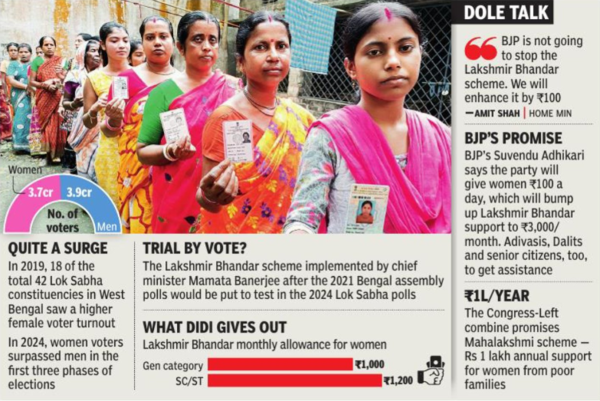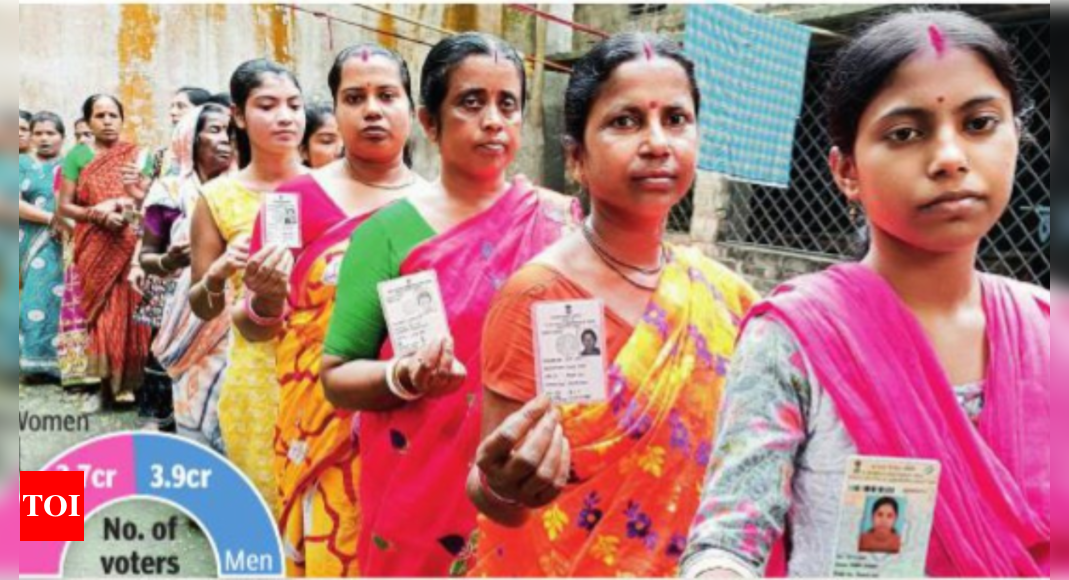For every 1,000 male voters on the 2024 Lok Sabha electoral rolls in West Bengal, 968 are women — an elusive lot that political parties are actively chasing this season. There has been an uptick in women’s poll turnout since 2019, sometimes even outpacing male voters. Political parties are now losing their sleep over this new constituency. Each party is trying to woo the emergent woman voter with freebies, guarantees and counter-guarantees, curating a gendersensitive narrative throughout the election campaign.
Steady rise in numbers
The voter turnout figures for the 2019 Lok Sabha polls in Bengal was an eye-opener for political parties — women topped with a higher turnout rate in 18 of the 42 Lok Sabha constituencies in the state, helmed by a woman chief minister. This means that in these 18 seats, a higher proportion of women electors turned up to vote compared to their male counterparts. For instance, in Cooch Behar 82.4% of male electors and 85.3% of female electors voted in the elections.
The same elections also saw women voters outnumbering men in gross votes polled in six Bengal Lok Sabha constituencies — Maldaha Uttar, Maldaha Dakshin, Jangipur, Baharampur, Murshidabad, and Ghatal. For instance, in Maldaha Uttar, 6.6 lakh men and 6.9 lakh women voted.

Voting trends for 2024 LS polls show that there is no departure from this trend in at least the first three phases of polls (the state is voting in all seven phases). For example, according to data available with the returning officer and shared with the TOI, the Balurghat Lok Sabha constituency from where BJP Bengal president Sukanta Majumdar contested the polls, witnessed a higher turnout of women voters than men. The election commission is yet to release actual breakup of votes based on gender.
Election Commission data is pivotal in understanding Bengal CM Mamata Banerjee’s Lakshmir Bhandar scheme, implemented for women from economically weaker sections of society, in 2021. The scheme, a monthly monetary support, benefits 2 crore women in Bengal where the total number of women voters is 3.73 crore.
Race to make women happy
Just before Lok Sabha poll dates were announced, Mamata hiked the Lakshmir Bhanadar allowance to Rs 1,000 for the general category and Rs 1,200 for the SC/STs. It is to be seen if this direct cash support overrides other factors in the polls when it comes to influencing women voters.
Those arguing the case cite the recently held assembly elections in Madhya Pradesh and Karnataka. The BJP benefited out of the Ladli Behna scheme among other freebies in MP while Congress reaped dividends after making a ‘Five Guarantee’ promise in its poll manifesto, which includes free bus rides for women (Shakti scheme), and Rs 2,000 for every woman head of the house (Gruhalakshmi). The Lakshmir scheme, implemented after the 2021 Bengal assembly polls, would be put to test in the LS polls.
Though assembly polls do not match the grandeur of Lok Sabha elections, the principal Opposition in Bengal, BJP, is not discounting this factor. After Trinamool national general secretary Abhishek Banerjee told a rally in Basirhat Lok Sabha constituency that “no one can take away the Lakshmir Bhandar scheme as long as the Trinamool is in power”, Union home minister Amit Shah assured voters last week that “the BJP is not going to stop the Lakshmir Bhandar scheme”. “We will enhance it by Rs 100,” Shah had said.
Bengal BJP leader Suvendu Adhikari took Shah’s statement a notch up, saying “BJP will give women Rs 100 a day” — which, if implemented, will make Lakshmir Bhandar payout Rs 3,000 a month. Adhikari also announced a similar scheme for Adivasis, Dalits and senior citizens. The Congress-Left combine, too, announced Mahalakshmi scheme, promising Rs 1 lakh yearly to women from poor families.
Not easy to win over
The way political parties rival each other in scripting schemes for women only explains their desperation, and it could not finally have a huge impact on the ground. A look at the Election Commission data on the 2019 Lok Sabha elections doesn’t establish a direct correlation between women-oriented schemes and the election results in the 18 constituencies in which women voter turnout rate was higher. For instance, prior to Lakshmir Bhandar, the Bengal CM had announced Kanyashree (support for girl students) and Swasthya Sathi (family health card in the name of a woman member), in 2013 and 2016 respectively. But when the 2019 LS results were announced, of the 18 constituencies where women voter turnout surpassed that of men, Trinamool bagged nine seats while seven went to BJP and two to Congress.
Vote chase gets toxic
The competition among political parties to impress women voters goes off the track at times — as evident from what has been playing out in Sandeshkhali, a village in Bengal’s North 24 Parganas district.
Sandeshkhali witnessed a groundswell after some women there lodged complaints of landgrabbing and sexual assault by local Trinamool leaders. The incident drew national attention and prompted the Calcutta High Court to take cognizance of the matter suo motu. A viral video later claimed sexual harassment complaints were doctored, which was followed by arrests of BJP functionaries. And the woman voter, evidently, lies at the heart of these slanging matches.
Steady rise in numbers
The voter turnout figures for the 2019 Lok Sabha polls in Bengal was an eye-opener for political parties — women topped with a higher turnout rate in 18 of the 42 Lok Sabha constituencies in the state, helmed by a woman chief minister. This means that in these 18 seats, a higher proportion of women electors turned up to vote compared to their male counterparts. For instance, in Cooch Behar 82.4% of male electors and 85.3% of female electors voted in the elections.
The same elections also saw women voters outnumbering men in gross votes polled in six Bengal Lok Sabha constituencies — Maldaha Uttar, Maldaha Dakshin, Jangipur, Baharampur, Murshidabad, and Ghatal. For instance, in Maldaha Uttar, 6.6 lakh men and 6.9 lakh women voted.

Voting trends for 2024 LS polls show that there is no departure from this trend in at least the first three phases of polls (the state is voting in all seven phases). For example, according to data available with the returning officer and shared with the TOI, the Balurghat Lok Sabha constituency from where BJP Bengal president Sukanta Majumdar contested the polls, witnessed a higher turnout of women voters than men. The election commission is yet to release actual breakup of votes based on gender.
Election Commission data is pivotal in understanding Bengal CM Mamata Banerjee’s Lakshmir Bhandar scheme, implemented for women from economically weaker sections of society, in 2021. The scheme, a monthly monetary support, benefits 2 crore women in Bengal where the total number of women voters is 3.73 crore.
Race to make women happy
Just before Lok Sabha poll dates were announced, Mamata hiked the Lakshmir Bhanadar allowance to Rs 1,000 for the general category and Rs 1,200 for the SC/STs. It is to be seen if this direct cash support overrides other factors in the polls when it comes to influencing women voters.
Those arguing the case cite the recently held assembly elections in Madhya Pradesh and Karnataka. The BJP benefited out of the Ladli Behna scheme among other freebies in MP while Congress reaped dividends after making a ‘Five Guarantee’ promise in its poll manifesto, which includes free bus rides for women (Shakti scheme), and Rs 2,000 for every woman head of the house (Gruhalakshmi). The Lakshmir scheme, implemented after the 2021 Bengal assembly polls, would be put to test in the LS polls.
Though assembly polls do not match the grandeur of Lok Sabha elections, the principal Opposition in Bengal, BJP, is not discounting this factor. After Trinamool national general secretary Abhishek Banerjee told a rally in Basirhat Lok Sabha constituency that “no one can take away the Lakshmir Bhandar scheme as long as the Trinamool is in power”, Union home minister Amit Shah assured voters last week that “the BJP is not going to stop the Lakshmir Bhandar scheme”. “We will enhance it by Rs 100,” Shah had said.
Bengal BJP leader Suvendu Adhikari took Shah’s statement a notch up, saying “BJP will give women Rs 100 a day” — which, if implemented, will make Lakshmir Bhandar payout Rs 3,000 a month. Adhikari also announced a similar scheme for Adivasis, Dalits and senior citizens. The Congress-Left combine, too, announced Mahalakshmi scheme, promising Rs 1 lakh yearly to women from poor families.
Not easy to win over
The way political parties rival each other in scripting schemes for women only explains their desperation, and it could not finally have a huge impact on the ground. A look at the Election Commission data on the 2019 Lok Sabha elections doesn’t establish a direct correlation between women-oriented schemes and the election results in the 18 constituencies in which women voter turnout rate was higher. For instance, prior to Lakshmir Bhandar, the Bengal CM had announced Kanyashree (support for girl students) and Swasthya Sathi (family health card in the name of a woman member), in 2013 and 2016 respectively. But when the 2019 LS results were announced, of the 18 constituencies where women voter turnout surpassed that of men, Trinamool bagged nine seats while seven went to BJP and two to Congress.
Vote chase gets toxic
The competition among political parties to impress women voters goes off the track at times — as evident from what has been playing out in Sandeshkhali, a village in Bengal’s North 24 Parganas district.
Sandeshkhali witnessed a groundswell after some women there lodged complaints of landgrabbing and sexual assault by local Trinamool leaders. The incident drew national attention and prompted the Calcutta High Court to take cognizance of the matter suo motu. A viral video later claimed sexual harassment complaints were doctored, which was followed by arrests of BJP functionaries. And the woman voter, evidently, lies at the heart of these slanging matches.
Source link

